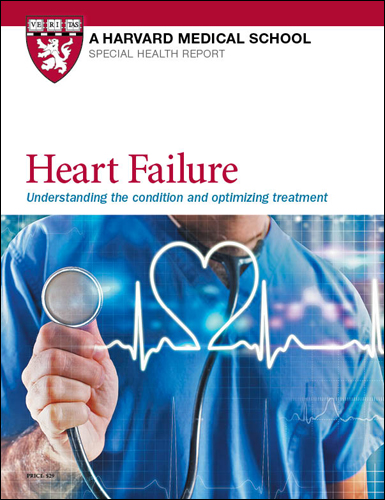Possible causes of an enlarged heart
Ask the doctor

Q. I had a chest x-ray recently because of suspected pneumonia and it showed that my heart is enlarged. What are the possible causes?
A. A heart that's bigger than normal, known as cardiomegaly, has many possible causes. Endurance athletes, such as competitive runners and cyclists, may have hearts that have grown larger and more efficient as a natural response to all that intensive exercise.
But in the vast majority of cases, an underlying medical problem is to blame. Probably the most common cause is high blood pressure, which forces the heart to work harder than usual. That leads the wall of the heart's main pumping chamber (the left ventricle) to thicken, a condition known as hypertrophy. It's similar to the way the muscles in your arms and legs get bigger when you work them, although in a manner that is not healthy.
Problems with one of the heart's four valves can also cause cardiomegaly. For example, a leaky aortic or mitral valve can lead to a higher volume of blood in the left ventricle, which responds by getting larger. A very narrowed aortic valve (aortic stenosis) can raise pressure inside the left ventricle and lead to hypertrophy.
Various forms of heart muscle disease (cardiomyopathy) can also enlarge the heart. The most common inherited form of cardiomyopathy, called hypertrophic cardiomyopathy, affects about one in 500 people. The genetic mutations responsible for this condition cause heart muscle to thicken. Amyloidosis, a group of diseases marked by clumps of abnormal protein in tissues throughout the body, can affect the heart, leading to thickening and enlargement.
In some cases, instead of causing the left ventricle wall to thicken, the damaged muscle thins and stretches out of shape, making the heart expand. Known as dilated cardiomyopathy, this condition often runs in families, although the exact genetic underpinnings aren't yet fully understood.
There are many other possible reasons for cardiomyopathy. A rare condition called myocarditis (inflammation of the heart muscle) can result from normally harmless viral infections such as the common cold or the flu, although the exact cause is often a mystery. Other possible causes include heart attacks due to underlying coronary artery disease, drug or alcohol abuse, certain cancer drugs, toxins, or inborn heart defects.
All of the above conditions can weaken the heart and impair its ability to pump enough blood to the body, resulting in heart failure.
Image: © ttsz/Getty Images
About the Author

Deepak L. Bhatt, M.D., M.P.H, Former Editor in Chief, Harvard Heart Letter
Disclaimer:
As a service to our readers, Harvard Health Publishing provides access to our library of archived content. Please note the date of last review or update on all articles.
No content on this site, regardless of date, should ever be used as a substitute for direct medical advice from your doctor or other qualified clinician.
















